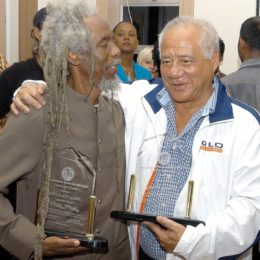Christopher Henry Gayle unleashed his famously powerful batting on the hapless England team in a fleeting glimpse of West Indian glory in November last year. This feat for the Stanford Superstars earned him and the other players on the winning team a whopping US$1 million.
Gayle has become a dominating force in the one-day game, feared by opposing bowlers around the world with his distinctive style – minimal foot movement, maximum use of leverage due to his height (he is six-foot-two tall), and large numbers of sixes. The dreadlocked, enigmatic Jamaican (his quiet, cool demeanour is often misinterpreted as being brooding and distant) was born on September 21, 1979 in Kingston, Jamaica. His deep roots in cricket come from a cricket-mad family that grew up in Duhaney Park.
Locally he represented Excelsior High School, also the alma mater of Courtney Walsh and later Lucas Cricket Club in Jamaica’s domestic tournament. As a left-handed opening batsman and right-arm off-break bowler he made his first-class debuts in 1998 for the West Indies “A” team versus a young India XI in India, for Jamaica versus the West Indies “A” team, and for Jamaica versus the USA in Jamaica. His One-Day International debut for the senior West Indies team was in 1999, versus India in Toronto, Canada. He played his first Test match against Zimbabwe in Trinidad in 2000, and his Twenty20 International West Indies debut was in 2006 versus New Zealand, in New Zealand.
His career has not been without controversy. In 2006 he was charged with conduct contrary to the spirit of cricket during a Test against New Zealand, but was found not guilty. Later that year, during October’s Champions Trophy tournament in India, he was fined 30 per cent of his match fee after repeated verbal exchanges with an Australian batsman. He also publicly criticised the West Indies Cricket Board during the 2007 tour of England, which led to an official reprimand and warning.
Gayle was appointed captain of the West Indies, in the absence of the injured Ramnaresh Sarwan, for the limited-overs series in England and Ireland in 2007, and was successful in beating England 2-1. He also led Jamaica to victory in the 2007/08 KFC Cup. Since that time he has held the reins of captaincy with mixed results. After his team’s emphatic victory over the England team in the 2008 Stanford tournament, he was quoted as saying in an interview: “Words can’t explain the way I am feeling after winning US$1 million…the feeling is tremendous. We are very grateful for what happened.
“The thing about me is that no one can tell I am under pressure, I don’t show emotion that much…This is better than anything in the world.”
Career highlights
For updated statistics visit http://content-wi.cricinfo.com/ci/content/player/51880.html
- Highest Test score 317; eight centuries, 29 fifties, total 4,804 runs in 73 games
- Highest ODI score 153 not out, 18 centuries, 37 fifties, total 6,851 runs in 189 games
- Highest Twenty20 score 117 (the highest in this format of the game and only player to have scored centuries in the three international formats of the game)
- Best bowling in a Test 5-34, total 150 wickets
- Best bowling in an ODI 5-46, total 63 wickets
- 19 times ODI Player of the Match
- Player of the Tournament award, ICC champions trophy 2006
- One of only a few players in ODI history to have three or more scores of 150
- In 2004, he blasted Matthew Hoggard for six fours in an over, becoming the first batsman to do so in a Test from a six-ball over
- He suffered a first-ball dismissal in his first Test


















